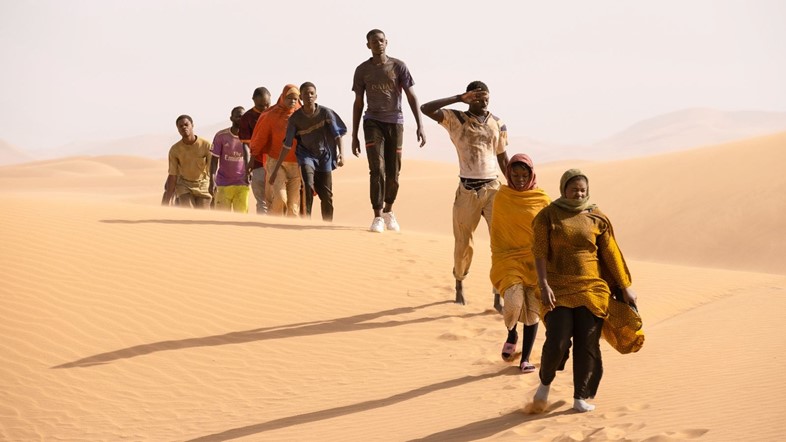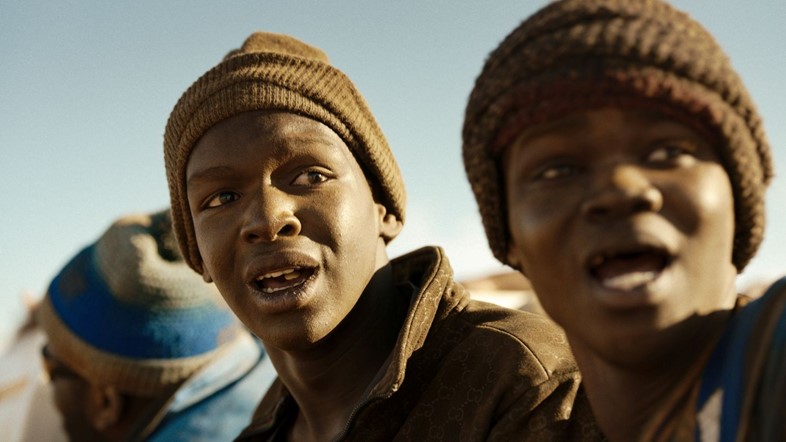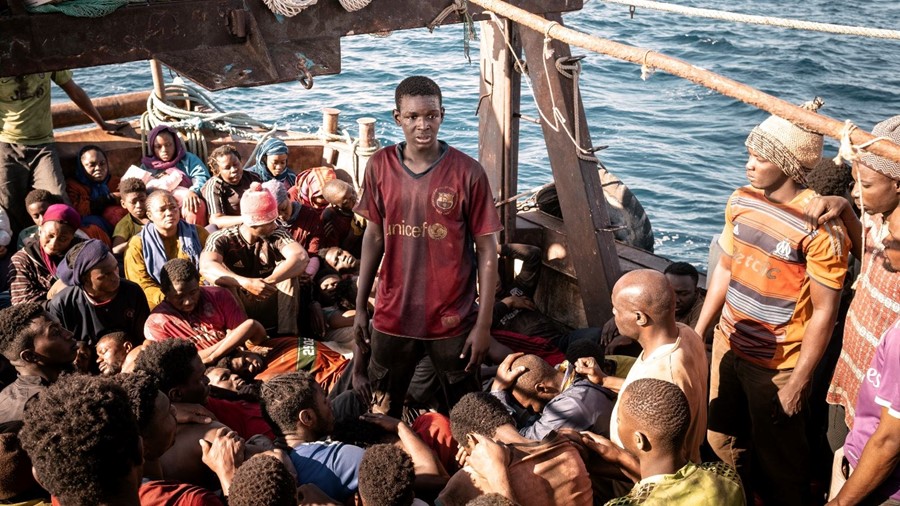Director Matteo Garrone talks about his tale of migrant teens crossing the desert to reach Europe, and why “we should be there at the ports” when they arrive
When Joaquin Phoenix met Seydou Sarr, the 21-year-old star of Io Capitano, at the Golden Globes in January, he bowed and told him he’d been blown away by his performance. “He might as well have been the bus driver or something,” laughs director Matteo Garrone, who knows he got lucky casting the first-timer in his film. “Seydou had no idea who he was.”
Garrone met Sarr, a Senegalese football nut with dreams of playing for a top-flight European club, when his family encouraged him to audition for a part in the epic migrant drama, one of the year’s most exciting and harrowing films. The director envisaged his story as a sort of “reverse shot of what we’re used to seeing” of migrants in the news, depicting two teenagers’ nightmare journey across the desert to reach Tripoli, and passage to Sicily via the Mediterranean Sea. Unusually, he would attempt to tell this story – “the journey of our era, in a way” – as a grand adventure.
“The structure is very classic,” says the director, perhaps best known for his 2008 mob drama Gomorrah. “I wanted the movie to be accessible to every age. And when I started listening to the stories [of real-life migrants who’d come from Africa] I immediately thought about the novels of Robert Louis Stevenson and Jack London, [Joseph] Conrad, you know?” He found his stars in Sarr and Moustapha Fall, who bring irresistible energy to their roles as Dakar teens Seydou and Moussa, seeking fame in Europe as musicians. Sarr, in particular, is outstanding as the smarter of the two, cagey at first but soon discovering previously hidden powers of leadership as the pair are thrust into a world of people smugglers, corrupt officials, gangsters and assorted traffickers in human misery.
For Garrone, it was vital that the heroes of his film should not be fleeing famine or conflict; indeed, the lives they leave behind in Dakar seem far from unhappy. But Seydou and Moussa have smartphones, and smartphones fill people’s heads with all kinds of funny ideas. “I wanted to show that these are people with the same desires we have, the same dreams,” says the director. “They are not always escaping from war. We wanted to show that globalisation has arrived in Africa just like here; [except that in Africa], 70% of the population is young, and they all have access to social media.”
In the film’s opening scenes, we see the pair out and about in Dakar, doing normal teenage stuff. They go to a sabar – dance party – and stash away money for their trip to Europe, an idea friends and family warn them away from repeatedly as dangerous. But the romance of escape proves too strong, and the pair begin their epic trek across the Sahara and the Mediterranean Sea, a journey that’s claimed many thousands of lives over the past decade. “Seydou and Moussa are following their dreams because they’re young and they want to discover the world,” says Garrone. “Because they see a world on screen that is full of light and promise. They know it is dangerous, but they are young so they think they’ll succeed.”

The first sign that this journey won’t go as Seydou and Moussa hope it will comes at the border, where they’re given fake Malian passports by a forger and told not to forget their assumed nationality. But it’s not until an incident in the desert, when a fellow traveller is left for dead in the heat, that the stakes become painfully clear. (Garrone purposely kept Sarr and Fall in the dark about their characters’ fates, to better elicit frightened responses.) Despite their brutality, these scenes are sumptuously shot by cinematographer Paolo Carnera in epic takes that consciously evoke the likes of Lawrence of Arabia. It’s here that Garrone, whose career to date has wobbled strangely between unflinching realism (Gomorrah, Dogman) and eccentric flights of fancy (Tale of Tales, Pinocchio), brings a touch of fantasy to the narrative, a delirious Seydou psychically communing with family members back home while stranded in the desert.
Since the film’s release in Italy last September, Garrone has taken it to schools across the country to educate kids on an issue that’s become toxic in the extreme, especially in Italy. Many went in expecting to be bored or browbeaten by a worthy ‘social issue’ film, only to meet with a thrilling coming-of-age story powered by charismatic, relatable young leads. Another unexpected fan of the film, Pope Francis, gave it his benediction after a private screening early this year, a holy thumbs-up Garrone says may account for the surprising lack of criticism from the country’s political class.

In fact, Garrone is careful to steer his film away from politics completely, pointing to failures on the left and right in contributing to the migrant crisis. The film started shooting in the spring of 2022, months before the far-right populist Giorgia Meloni swept to power in Italy, and while anti-migrant rhetoric has certainly ramped up since then, some of the film’s most brutal scenes take place in a Libyan jail, with militias extorting and then torturing inmates. These militias are employed by the Libyan state, under a deal struck with Italy’s then-PM Paolo Gentiloni, a social democrat, in 2017. “The complicity in this system is global,” notes Garrone.
For all that, Io Capitano ends on a note of defiance that serves as a reminder of the many benefits migrants bring to European cultures and economies, if we could only stop thinking of them as a burden. “Of course, we often don’t think about how these people can help us,” says Garrone, wrapping up. “[These kids] have such a powerful energy, humanity, innocence in a way. A friend of mine who used to work for Médecins Sans Frontières said we should be there at the ports when they arrive. We should be there waiting with music and applause for what they have done.”
Io Capitano is out in UK cinemas now.
